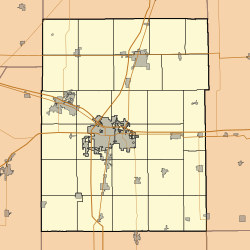Homer, Illinois
| Homer | |
|---|---|
| Village | |
 Location of Homer in Champaign County, Illinois. |
|
| Location within Champaign County | |
| Coordinates: 40°2′6″N 87°57′32″W / 40.03500°N 87.95889°WCoordinates: 40°2′6″N 87°57′32″W / 40.03500°N 87.95889°W | |
| Country | United States |
| State | Illinois |
| County | Champaign |
| Founded | 1855 |
| Government | |
| • Mayor | Raymond Cunningham |
| Area | |
| • Total | 0.98 sq mi (2.54 km2) |
| • Land | 0.98 sq mi (2.54 km2) |
| • Water | 0.00 sq mi (0.00 km2) |
| Elevation | 676 ft (206 m) |
| Population (2010) | |
| • Total | 1,193 |
| • Estimate (2016) | 1,179 |
| • Density | 1,201.83/sq mi (464.02/km2) |
| Time zone | CST (UTC-6) |
| • Summer (DST) | CDT (UTC-5) |
| Postal code | 61849 |
| Area code(s) | 217 |
| FIPS code | 17-35814 |
Homer is a village in Champaign County, Illinois, United States. Its population was 1,193 at the 2010 census.
Homer grew from a settlement named Union, which was on the Fort Clark or State Road running between Danville and Urbana, nearly three miles north of the present town. Union was little more than several cabins built in 1829-30, but it served as a post office and meeting place in what was Vermilion County prior to the creation of Champaign County in 1833. Moses Thomas, a native of Pennsylvania, built a mill on the Salt Fork creek southeast of Union in 1834 and began to mill grain. A young merchant traveling from Indiana, Michael Doctor Coffeen, built a store adjacent to the mill, and with Thomas created the village of Homer on January 26, 1837. The post office was moved to Homer with M. D. Coffeen as postmaster in 1841.
Homer grew to 120 people in 1850, and the coming of the Great Western Railroad to the south of the town prompted the village to move to its present location. In February 1855, the town's 32 buildings were dragged 1.5 miles south by 18 teams of oxen. The village became a stop on the railway, later named the Wabash Railroad, becoming the center of agriculture in eastern Champaign County.
In 1905, the town became the location for Homer Park, an amusement park on the Illinois Traction System interurban line. Homer Park, north of the village on the Salt Fork creek, offered swimming, food, baseball, movies and even a small zoo. The park closed in 1937 after flooding and poor management.
The Homer School District, which served the village and the surrounding area, set a record for the longest teacher's strike in the nation's history, spanning from October 26, 1986, to June 23, 1987. At 156 days, the strike was more than twice as long as the second-longest, set by a school district near Cleveland, Ohio during the 2002-2003 school year. At issue throughout the negotiations was the salary formula, which the Chicago Tribune reported was "not likely to drastically change the pay rates of ... teachers." Other provisions included allowing teachers fired during the strike to be allowed to return with no loss of salary or seniority and the district's newly unionized support staff getting a 6 percent pay increase beginning July 1, and an additional 2 percent increase at the beginning of the 1988-1989 school year. Legal fees were estimated to be $150,000.
...
Wikipedia


